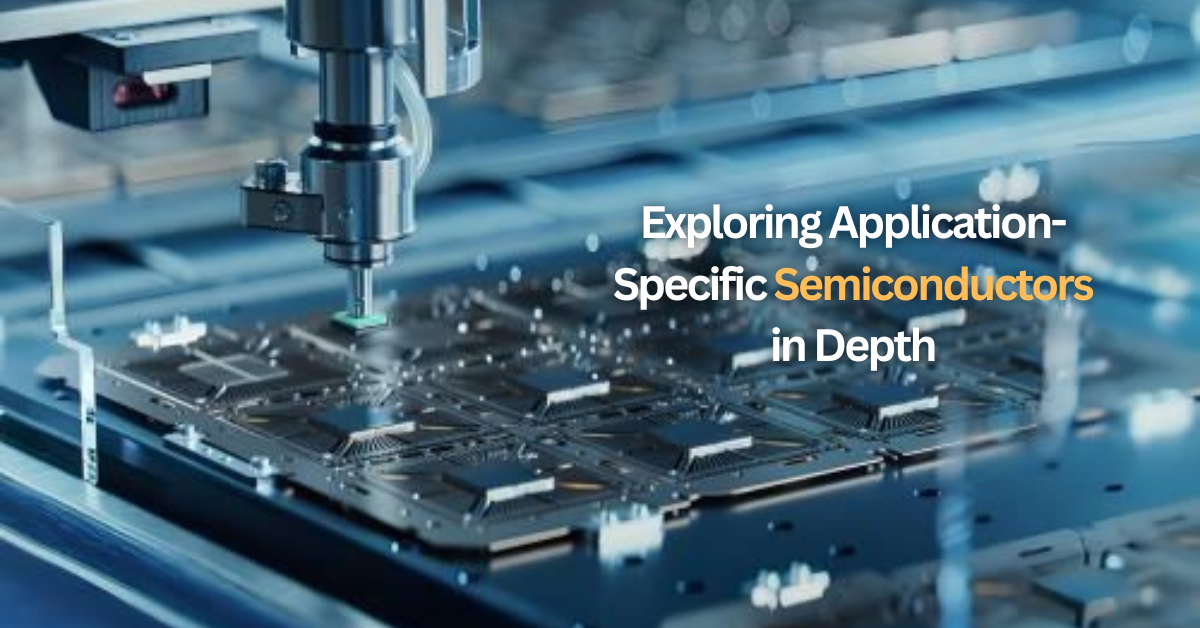At Cyprus Magazine, we often explore innovations that shape the industries of tomorrow. Among the most transformative technologies influencing electronics and digital transformation today are Application-Specific Semiconductors. These custom-designed chips are quietly powering a new era of computing, communication, and connected devices, while also redefining how industries approach efficiency and performance.
Unlike general-purpose chips, Application-Specific Semiconductors are tailored to serve unique tasks within systems. From medical equipment and automotive technologies to financial systems and consumer electronics, their presence is growing rapidly. This article dives deep into what makes these chips so revolutionary, the industries driving their adoption, and the potential future that lies ahead.
The Evolution of Application-Specific Semiconductors
Application-Specific Semiconductors did not appear overnight. Their rise is rooted in the evolution of electronics and the increasing demand for chips designed to perform specialized tasks. As industries pushed for greater speed, energy efficiency, and reliability, traditional general-purpose processors struggled to meet these demands. The answer came in the form of customized semiconductor solutions that could be optimized for one application at a time.
Over the years, their role has expanded beyond experimental use to mainstream adoption across healthcare, automotive systems, finance, and consumer electronics. Each step in their evolution has been tied to breakthroughs in design tools, fabrication methods, and the relentless drive for smarter, smaller, and more powerful devices.
Why Application-Specific Semiconductors Matter
Application-Specific Semiconductors represent the intersection of precision engineering and innovation. Their importance lies in how they bring together performance and efficiency. Instead of handling a wide range of tasks like general-purpose chips, they focus on one set of functions and perform them with unmatched reliability.
For example:
- In medical technology, they power imaging equipment and life-saving devices with precision.
- In automotive engineering, they enable advanced driver assistance and vehicle safety systems.
- In communication, they provide faster data processing for seamless connectivity.
The outcome is not just faster performance but also reduced energy consumption and improved reliability.
Tailored Design: The Core of Application-Specific Semiconductors
What sets these chips apart is their customized design process. Engineers analyze the unique requirements of a product or system and then design a semiconductor that aligns with those goals. This process involves multiple stages:
Requirements Analysis
Every Application-Specific Semiconductor begins with understanding what the system demands speed, power efficiency, or durability.
Circuit Design
Once requirements are clear, circuit architects design structures that optimize the chip for its intended function.
Fabrication
The chip is manufactured using advanced fabrication technologies, often requiring state-of-the-art semiconductor foundries.
Testing and Validation
Rigorous testing ensures the chip functions precisely as intended under varied conditions.
This tailored process explains why these semiconductors consistently outperform general-purpose alternatives.
Key Industries Benefiting from Application-Specific Semiconductors
Application-Specific Semiconductors touch almost every industry today. Their reach continues to expand as more organizations understand their potential.
Healthcare
These chips are integrated into diagnostic devices, wearable monitors, and imaging systems. Their accuracy ensures life-critical systems perform without compromise.
Automotive
Smart vehicles rely on these semiconductors for safety features, navigation, and performance optimization. They are the backbone of the transition toward autonomous driving.
Telecommunications
From mobile networks to satellite communications, Application-Specific Semiconductors make data faster, clearer, and more secure.
Consumer Electronics
Smartphones, gaming consoles, and home automation systems depend on these chips for efficiency and responsiveness.
Financial Systems
High-frequency trading, secure banking systems, and fraud detection use Application-Specific Semiconductors to deliver unmatched speed and accuracy.
Comparing Application-Specific Semiconductors with General-Purpose Chips
| Feature | Application-Specific Semiconductors | General-Purpose Chips |
| Performance | Optimized for specific tasks | Balanced for broad use |
| Energy Efficiency | High efficiency | Moderate efficiency |
| Cost | Higher initial investment | Lower cost initially |
| Scalability | Suited for specialized systems | Easily scalable |
| Reliability | Extremely reliable for designed task | Reliable but less focused |
Challenges in Application-Specific Semiconductor Development
Despite their benefits, developing these chips is not without challenges.
High Development Cost
The design and fabrication process demands significant investment.
Longer Time-to-Market
Custom chips take longer to develop compared to general-purpose alternatives.
Limited Flexibility
Once designed, they cannot easily be repurposed for other tasks.
Rapid Technological Changes
Fast innovation in technology means chips risk becoming outdated sooner.
Steps in Building a Successful Application-Specific Semiconductor
Creating these semiconductors involves careful planning and execution.
- Define clear requirements for the system.
- Collaborate with skilled design teams.
- Choose advanced fabrication partners.
- Prioritize energy efficiency and durability.
- Validate performance under real-world conditions.
Following these steps ensures chips meet expectations and deliver measurable value.
The Future of Application-Specific Semiconductors
Looking forward, the importance of Application-Specific Semiconductors is only expected to grow. With artificial intelligence, autonomous systems, and the Internet of Things demanding specialized computing power, these chips are positioned at the center of innovation.
Emerging trends include:
- Miniaturization for wearable and embedded devices.
- Greater energy efficiency for sustainability.
- Integration with AI to power next-generation applications.
- Expansion in global industries seeking reliable, custom solutions.
At Cyprus Magazine, we see these developments as the foundation of a digital-first future where technology becomes even more integrated with human life.
FAQs
What are Application-Specific Semiconductors?
They are custom-designed chips created to perform specialized tasks with high efficiency and accuracy.
How do they differ from general-purpose chips?
Unlike general chips, which handle a wide range of functions, Application-Specific Semiconductors focus on one specific application and deliver superior performance.
Which industries use Application-Specific Semiconductors most?
They are commonly used in healthcare, automotive, telecommunications, finance, and consumer electronics.
What are the main challenges in developing these chips?
High cost, longer development timelines, and the risk of technological obsolescence are key challenges.
Are Application-Specific Semiconductors the future of computing?
Yes, their role is expanding as industries seek specialized, energy-efficient, and high-performance solutions.
Conclusion
Application-Specific Semiconductors represent a defining moment in the world of technology. Their unique ability to combine precision, efficiency, and reliability makes them vital for industries aiming to innovate and excel. At Cyprus Magazine, we view these chips not just as components of electronics but as building blocks of the connected future. Whether in healthcare, transportation, finance, or communication, their influence continues to grow, shaping the path toward smarter and more sustainable systems.




